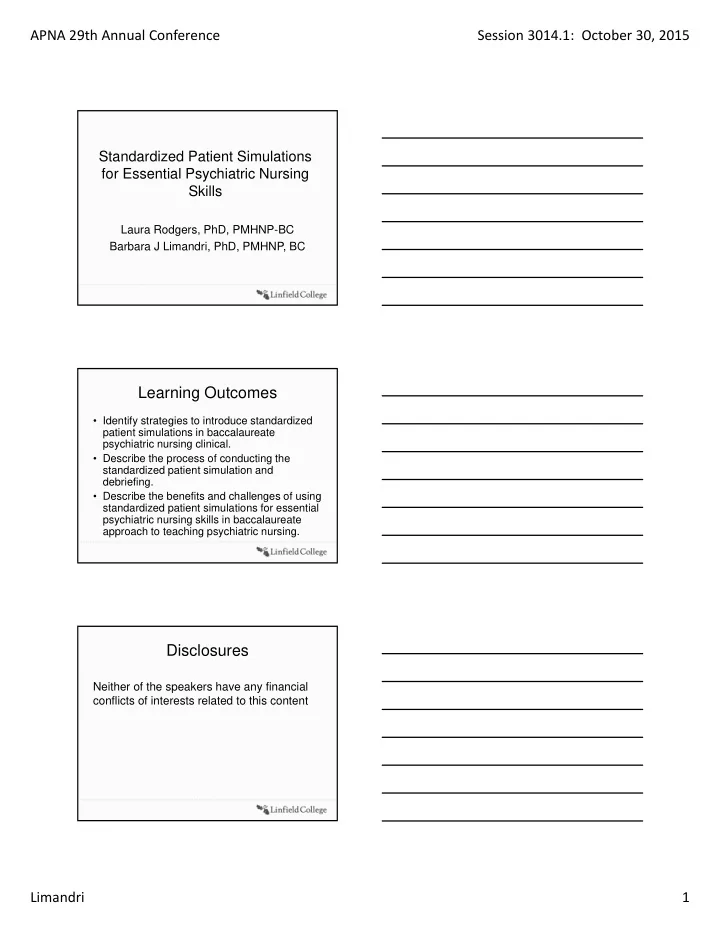

APNA 29th Annual Conference Session 3014.1: October 30, 2015 Standardized Patient Simulations for Essential Psychiatric Nursing Skills Laura Rodgers, PhD, PMHNP-BC Barbara J Limandri, PhD, PMHNP, BC Learning Outcomes • Identify strategies to introduce standardized patient simulations in baccalaureate psychiatric nursing clinical. • Describe the process of conducting the standardized patient simulation and debriefing. • Describe the benefits and challenges of using standardized patient simulations for essential psychiatric nursing skills in baccalaureate approach to teaching psychiatric nursing. Disclosures Neither of the speakers have any financial conflicts of interests related to this content Limandri 1
APNA 29th Annual Conference Session 3014.1: October 30, 2015 Identified Challenges • Psychiatric-mental health nursing content ever growing but curricular space is retracting • Demands on clinical placements • Limitations of clinical sites • Reductions in amount of time in clinical sites Identified Needs • What is essential for every baccalaureate nurse to know to be a nurse today and in the near future? • What are essential skills that every baccalaureate nurse needs to demonstrate today and in the near future? • How do we provide that in a standardized way given curricular resources? Knowledge • Scope and standards of psychiatric-mental health nursing • Basics of mental disorders • Life span approach • Chronic care and acute care • Neuroscience of mental disorders and treatments Limandri 2
APNA 29th Annual Conference Session 3014.1: October 30, 2015 Attitudes • Compassion as an antidote to stigma • Commitment to the Recovery Model • Community based care • Every nurse is a psychiatric nurse Skills • Therapeutic communication • Mindfulness • Critical thinking • De-escalation • Validation Essential Skills • Assessment and management of the acutely suicidal person • Communication with the person who is hallucinating • Communication and management of the person who is in a manic state • Addressing medication self-management Limandri 3
APNA 29th Annual Conference Session 3014.1: October 30, 2015 Simulation • Low, medium and high fidelity • Good ole role plays • Talking manikins • Simulation lab Standardized Patients • Traditionally used for physical assessment skills • Specialized actors • Interviewing and auditioning • Training • Briefing and debriefing Developing Scenarios • NLN Center for Innovation in Simulation and Technology – Simulation Innovation Resource Center – Training in developing simulation • Script writing • Expectations and preparations for students • Simulation environment Limandri 4
APNA 29th Annual Conference Session 3014.1: October 30, 2015 Scenarios • David with bipolar disorder in a manic episode, presenting in the ED • Frank with schizophrenia hallucinating and off meds, presenting in day treatment • Helen with severe depression and suicidal, presenting in PCP’s office David Frank Limandri 5
APNA 29th Annual Conference Session 3014.1: October 30, 2015 Helen Debriefing • Students complete brief reflection • Meet as a group to view all the videos • How to critique colleague performances • Review together with SP attending as available • Received critique by SP Outcomes • Most students became engaged with the reality of the simulation • All expressed incredible learning • Clinical faculty expressed leap in students’ therapeutic communication awareness Limandri 6
APNA 29th Annual Conference Session 3014.1: October 30, 2015 Faculty Critique • Need to prepare students for experience • SPs drifted toward greater authenticity and responsiveness to students • Debriefing required more time than could be allotted • Need to modify rubric to be more general • Recognition of therapeutic communication skill deficits What We Learned • Students found this to be an incredible learning experience • Debriefing was lengthy and detailed, and students wanted the critique • Continue to refine the process including technology and scenario design • Having the SPs offer their critique provided another layer of learning What We Learned • Reducing the time for each scenario to press students to get to the point • Provide clear directions of what was expected of students • Moving the experience to different times in the term provided different kinds of learning Limandri 7
APNA 29th Annual Conference Session 3014.1: October 30, 2015 References • Becker, K.L., Rose, L.E., Berg, J.B., Park, H., Shatzer, J.H. (2006). The teaching effectiveness of standardized patients. Journal of Nursing Education, 45: 103-110. • Buccheri, R.K.; Trygstad, L.N.; Buffum, M.D.; Lyttle, K.; Dowling, G. (2010). Comprehensive evidence-based program teaching self- management of auditory hallucinations on-inpatient psychiatric units. Issues in Mental Health Nursing 31, 223-231. • Cooper, J., Martin, T., Walker, J. Fisher, W., Helms, P. (2010). Integrating standardized patients and clinical simulations in a mental health nursing course. Clinical Simulations in Nursing, 6, e. 110. • Guise, V, Chambers, M., Valimaki, M. (2012). What can virtual patient simulation offer mental health nursing education? Journal of Psychiatric and Mental Health Nursing, 19 , 410–418. References • Jeffries, P., & Rogers, K. (2007). Theoretical framework for simulation design. In P. Jeffries (Ed.), Simulation in Nursing Education (pp. 21-33). New York: National League for Nursing. • Lasater, K. (2007). High fidelity simulation and the development of clinical judgment: Student experiences. Journal of Nursing Education, 46(6), 269-276. • Video : YouTube Video: http://www.youtube.com/watch?v=dkB2CGL769o Limandri 8
Recommend
More recommend